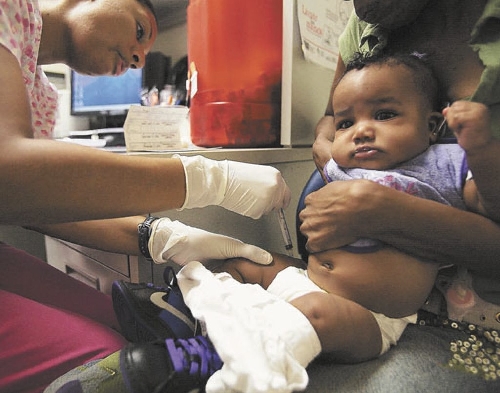Las Vegas hepatitis cases spark CDC video on unsafe injections

A new training video for the nation’s medical professionals, which was released Wednesday, was sparked largely by the hepatitis C outbreak in Las Vegas, according to a federal medical officer.
"What happened in Las Vegas has played a critical role in our deciding to remind providers throughout the country that every injection should be a safe one," Dr. Melissa Schaefer of the Centers for Disease Control and Prevention told the Review-Journal on Wednesday. "We want medical professionals to look carefully at their practices."
The video shows three scenarios in three different settings where medications are prepared and administered: an operating room, an oncology clinic and a pain management clinic.
The viewer is taken through potential errors that can occur in medication handling and injection preparation and administration. Each scenario ends with a summary of steps that can and should be taken to assure safe care.
One message comes across loud and clear: "Use one needle, one syringe, only one time."
Schaefer said the 10-minute video, expected to be used by medical entities ranging from medical schools and hospitals to private practitioners and surgical centers, also dispels common myths about injection practices, including a belief that it is safe to administer medication from single-dose vials to multiple patients.
The hepatitis outbreak in Las Vegas was blamed on health care providers reusing single-dose vials of the anesthetic propofol among patients after they had become contaminated by reused syringes.
In 2008, local health officials urged 50,000 patients to get tested for hepatitis C, HIV and other blood-borne diseases because of unsafe injection practices at clinics run by Dr. Dipak Desai. More than 100 people are believed to have been infected.
In the past decade, 35 known hepatitis outbreaks have placed the health of more than 100,000 Americans at risk, according to public health officials.
Patty Aspinwall, whose hepatitis C infection was genetically traced to procedures that took place Sept. 21, 2007, at Desai’s Shadow Lane clinic, said that she is hopeful the video will make an impact on health care professionals.
"Even though these people should know what is safe, they obviously have to be reminded because a lot of them take chances," she said. "It appears that if it doesn’t affect them, they don’t care. But as important as the video is, it’s up to patients to ask questions about what is being done. You simply can’t rely on people in health care to do the right thing."
The outbreaks have to stop, said Dr. Michael Bell, the video’s narrator and the CDC’s deputy director for infection control.
"One infection due to unsafe injection practices in unacceptable," Bell said. "Every health care provider has the responsibility to ensure that all injections given to patients are safe."
The video is part of the "One & Only Campaign," a national public health education and awareness initiative developed by the Safe Injection Practices Coalition.
The coalition comprises patient advocacy organizations, foundations, health care providers and the CDC. It was put together largely by Nebraskan Evelyn McKnight, who contracted hepatitis C while undergoing chemotherapy for breast cancer.
She used settlement funds to found Hepatitis Outbreaks National Organization for Reform, or HONOReform, which first became known to Nevadans when McKnight testified at a Legislative Committee on Health Care hearing in the wake of the Las Vegas hepatitis outbreak.
McKnight, who is featured in the video, said that because of the "enormity of the suffering in Las Vegas," there is going to be "far more attention to injection practices everywhere."
"What happened in Las Vegas really moved this public health campaign forward," she said.
"The Safe Injections Training Video" can be viewed at www.oneandonlycampaign.org. Information is provided on how to order a free DVD of the video. McKnight said the video should also be viewed by those outside the medical profession "so they know which questions to ask doctors and nurses."
Nevada and New York have been the first to move forward with statewide efforts on safe injection campaigns.
Pilot testing of campaign materials through focus groups is complete, said Tara Thebus, a research analyst for the School of Community Health Sciences at the University of Nevada, Las Vegas. She said she expects Nevada to roll out an entire safety campaign this fall. Materials on injection safety will be made available to medical providers and patients, she said.
Patients will be given materials that include these questions for their medical providers:
"Will there be a new needle, new syringe, and a new vial for this procedure or injection?"
"Can you tell me how you prevent the spread of infections in your facility?"
In the first civil trial stemming from Southern Nevada’s hepatitis C outbreak, a jury ruled this month that two drug companies must pay Henry Chanin and his wife more than $5 million in actual damages and $500 million in punitive damages for providing too large vials of the anesthetic propofol to endoscopy centers and for failing to label drug vials with appropriate warnings.
Chanin was infected with hepatitis C during a colonoscopy at Desai’s Desert Shadow Endoscopy Center in 2006.
The Chanins’ lawyers argued that the drug companies endangered public safety by producing vials of propofol that were larger than necessary for typical endoscopic procedures, which enticed medical providers to reuse the vials among patients instead of throwing away leftover sedative.
As thankful as hepatitis C patient Aspinwall is that medical authorities are turning up the heat on medical providers when it comes to safe injection practices, she reminds people that, at least in Las Vegas, the hepatitis C outbreak may not have been a result of ignorance or accidents.
According to clinic staffers interviewed by city investigators, the dangerous injection practices used at the Desai clinics were undertaken at the direction of Desai and other administrators to save money.
Whether safety campaigns can defeat greed, Aspinwall said, is unknown.
Contact reporter Paul Harasim at pharasim@ reviewjournal.com or 702-387-2908.